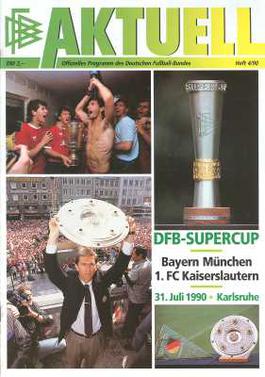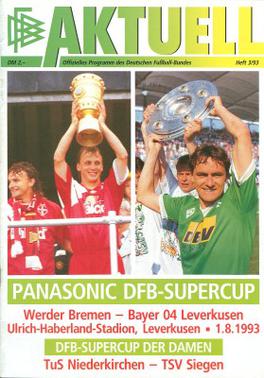The 1990–91 Bundesliga was the 28th season of the Bundesliga, the premier football league in West Germany. It began on 8 August 1990 and ended on 15 June 1991. FC Bayern Munich were the defending champions.

The DFL-Supercup or German Super Cup is a one-off football match in Germany that features the winners of the Bundesliga championship and the DFB-Pokal. The DFL-Supercup is run by the Deutsche Fußball Liga.
The 1991–92 DFB-Pokal was the 49th season of the annual German football cup competition. After the German reunification in 1990 the football association of eastern Germany, Nordostdeutscher Fußballverband, joined the German Football Association (DFB) on 21 November 1990. Football clubs from eastern Germany thus participated for the first time in the DFB-Pokal. 87 teams competed in the final tournament, which had thus to be extended to seven rounds. It began on 1 August 1991 and ended on 23 May 1992.
The 2008–09 DFB-Pokal was the 66th season of the annual German football cup competition. The competition began with the first round on 7 August 2008, and ended with Werder Bremen defeating Bayer Leverkusen, who for their part eliminated defending champions Bayern Munich in the quarter-finals, in the final at the Olympiastadion, Berlin on 30 May 2009. The winners of the 2008–09 DFB-Pokal would qualify to the fourth qualifying round of the 2009–10 UEFA Europa League.

The 1990 DFB-Pokal Final decided the winner of the 1989–90 DFB-Pokal, the 47th season of Germany's premier knockout football cup competition. It was played on 19 May 1990 at the Olympiastadion in West Berlin. 1. FC Kaiserslautern won the match 3–2 against Werder Bremen to claim their first cup title.
The 1990–91 NOFV-Pokal was the last edition of the East German Cup. During the competition, following German reunification in October 1990, the cup had been renamed from the FDGB-Pokal. After the 1990–91 season, the East German competitions were merged into the (West) German system, with clubs from the East now entering the DFB-Pokal.

The 1990 DFB-Supercup was the fourth DFB-Supercup, an annual football match contested by the winners of the previous season's Bundesliga and DFB-Pokal competitions.

The 1994 DFB-Supercup, known as the Panasonic DFB-Supercup for sponsorship purposes, was the eighth DFB-Supercup, an annual football match contested by the winners of the previous season's Bundesliga and DFB-Pokal competitions.

The 1996 DFB-Supercup, known as the Panasonic DFB-Supercup for sponsorship purposes, was the tenth DFB-Supercup, an annual football match contested by the winners of the previous season's Bundesliga and DFB-Pokal competitions. It was the last DFB-Supercup, with the competition replaced by a DFB-Ligapokal which ran from 1997 to 2007. The supercup returned in 2010, now run by the Deutsche Fußball Liga (DFL).
The 1990–91 FC Bayern Munich season was the 91st season in the club's history and 26th season since promotion from Regionalliga Süd in 1965. Bayern finished three points behind champions 1. FC Kaiserslautern in the Bundesliga. In the DFB-Pokal, Bayern were eliminated in the first round for the first time in club history. Bayern reached the semifinals of the European Cup before being eliminated by Red Star Belgrade due to an own goal in the 90th minute of the second leg. The first competitive match of the season was the DFB-Supercup on 31 July which Bayern won by a score of 4–1 over 1. FC Kaiserslautern.
The 2015–16 DFB-Pokal was the 73rd season of the annual German football cup competition. Sixty-four teams participated in the competition, including all teams from the previous year's Bundesliga and the 2. Bundesliga. It began on 7 August 2015 with the first of six rounds and ended on 21 May 2016 with the final at the Olympiastadion in Berlin, a nominally neutral venue, which has hosted the final since 1985. The DFB-Pokal is considered the second-most important club title in German football after the Bundesliga championship. The DFB-Pokal is run by the German Football Association (DFB).
The rivalry between football teams from East Germany and West Germany lasted from 1949 to 1990.

The 1988 DFB-Supercup was the second DFB-Supercup, an annual football match contested by the winners of the previous season's Bundesliga and DFB-Pokal competitions.
The 2009 German Supercup, known as the Volkswagen SuperCup for sponsorship reasons, was an unofficial edition of the German Supercup, a football match contested by the winners of the previous season's Bundesliga and DFB-Pokal competitions.
The 1991 DFB-Supercup Final decided the winner of the 1991 edition of the DFB-Supercup, a football competition contested by the winners of the previous season's West German league and cup winners, along with the East German league and cup champions.

The 1992 DFB-Supercup, known as the Panasonic DFB-Supercup for sponsorship purposes, was the 6th DFB-Supercup, an annual football match contested by the winners of the previous season's Bundesliga and DFB-Pokal competitions.

The 1993 DFB-Supercup, known as the Panasonic DFB-Supercup for sponsorship purposes, was the 7th DFB-Supercup, an annual football match contested by the winners of the previous season's Bundesliga and DFB-Pokal competitions.
The 2017–18 DFB-Pokal was the 75th season of the annual German football cup competition. Sixty-four teams participated in the competition, including all teams from the previous year's Bundesliga and the 2. Bundesliga. The competition began on 11 August 2017 with the first of six rounds and ended on 19 May 2018 with the final at the Olympiastadion in Berlin, a nominally neutral venue, which has hosted the final since 1985. The DFB-Pokal is considered the second-most important club title in German football after the Bundesliga championship. The DFB-Pokal is run by the German Football Association (DFB).
The 2018–19 DFB-Pokal was the 76th season of the annual German football cup competition. Sixty-four teams participated in the competition, including all teams from the previous year's Bundesliga and the 2. Bundesliga. The competition began on 17 August 2018 with the first of six rounds and ended on 25 May 2019 with the final at the Olympiastadion in Berlin, a nominally neutral venue, which has hosted the final since 1985. The DFB-Pokal is considered the second-most important club title in German football after the Bundesliga championship. The DFB-Pokal is run by the German Football Association (DFB).
The 2019–20 DFB-Pokal was the 77th season of the annual German football cup competition. Sixty-four teams participated in the competition, including all teams from the previous year's Bundesliga and 2. Bundesliga. The competition began on 9 August 2019 with the first of six rounds and ended on 4 July 2020 with the final at the Olympiastadion in Berlin, a nominally neutral venue, which has hosted the final since 1985. The DFB-Pokal is considered the second-most important club title in German football after the Bundesliga championship. The DFB-Pokal is run by the German Football Association (DFB).








